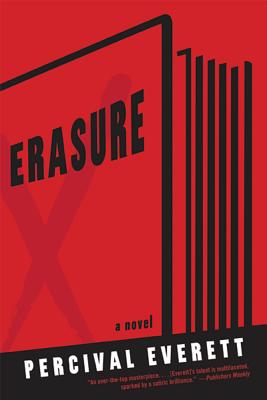 I think Erasure by Percival Everett is the first great manifesto for literature by African Americans in the 21st century.
I think Erasure by Percival Everett is the first great manifesto for literature by African Americans in the 21st century.
I believe, if the black literary/academic community was strong enough to anoint their own chosen star moving forward into the new era, it wouldn’t be Colson Whitehead, whose white-centered race books hark back to work done by Ellison and Himes half a century ago. Instead, it would be forward-looking to Everett’s post-black, self-contained humanism.
In many ways, I believe Erasure is, or will be, as important as that single issue of Fire! that the darlings of the Renaissance released so long ago. It identifies what’s wrong with the current state of modern African American literature, challenges the relation of artist to community in general, and transitions from aggressive nihilism to offer an open door to whatever comes next. It’s a kind of scorched earth policy for ushering in a better literary tomorrow.
Additionally, it’s a hilarious page-turner. I’ve revisited the book four times, and with each read, I discover an entirely new, gratifying layer. He’s not exactly a prose stylist, like Morrison or Wideman, but more of an innovator, a man of ideas. Even though I’m a prose aficionado, his approach works for me.
Everett himself is an enigma. Unassuming, reclusive, and totally disinterested in the commercial side of publishing—he deliberately partners with academic presses for modest advances due to his aversion to corporate influence over art. He’s genuinely a writer for writers.
His other works showcase remarkable diversity in both style and subject matter. I’ve delved into Suder, Walk Me to the Distance, Big Picture, Frenzy, Glyph, and Grand Canyon Inc., and I’m eagerly anticipating reading The History of the African American People by Strom Thurmond. If anyone has questions about these titles, feel free to ask.
I haven’t yet read For Her Brown Skin, mainly because Everett now regrets writing it. However, I do plan to explore it. It was his sole early commercial success, probably because it embraced more traditional African American themes. After its release, he garnered attention but was subsequently overlooked as he began to diversify his work.
While some critics misinterpret his use of white characters and non-racialized narratives as “selling out,” Everett has also consistently supported Callaloo and other black-centric literary endeavors.
If you’re interested, he’ll soon be in Jamaica for Calabash, the remarkable international, predominantly black literature festival organized by Colin Channer and Kwame Dawes. Everett will be sharing the spotlight with Zadie Smith. Although he often appears stern in photos, in person, he’s quite amiable and approachable.
Gush Gush Gush Gush Gush.
Originally posted January 12, 2004 by “InPrint” on the AALBC Discussion forum.
